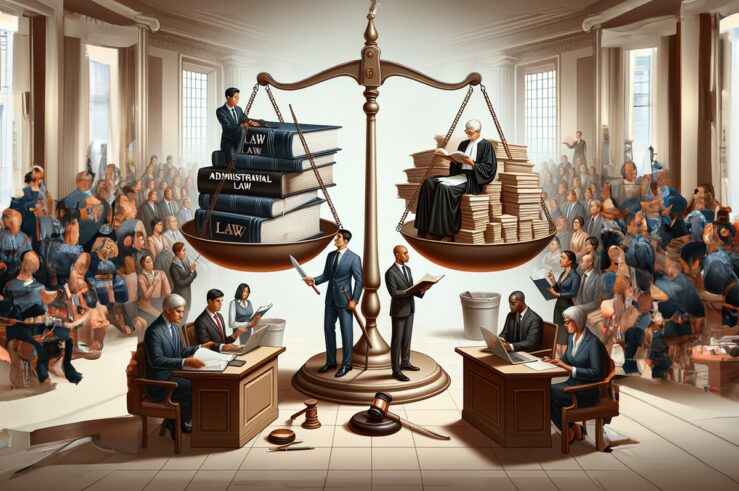Showing archive for: “Administrative Law”
FTC Sues ‘Big 3’ Pharmaceutical Benefit Managers
My last post highlighted a July 2024 Federal Trade Commission (FTC) interim staff report that was critical of pharmaceutical benefit managers (PBMs)—so-called “middlemen” firms that specialize in negotiating with drugmakers for rebates on the list prices of drugs. I explained that the interim report’s analysis is at odds with economic research that delineates the substantial economic benefits ... FTC Sues ‘Big 3’ Pharmaceutical Benefit Managers
FTC Noncompete Rule–and FTC Competition Rulemaking–Are on the Ropes
Judge Ada Brown of the U.S. District Court for the Northern District of Texas issued an Aug. 20 order effectively striking down the Federal Trade Commission’s (FTC) April 2024 rule barring noncompete clauses (“noncompetes”) in employment contracts. Ryan LLC, a global tax-services and software provider, had challenged the rule, which had been scheduled to take ... FTC Noncompete Rule–and FTC Competition Rulemaking–Are on the Ropes
Vacatur’s All I Ever Wanted
Yep, more about noncompetes. I’ve been at this a bit. I’m aware. Just last week, and then again here, here, here, here, and here at Truth on the Market; here in a more formal journal article; and here with my International Center for Law & Economics (ICLE) colleagues and scholars of law and economics. Maybe ... Vacatur’s All I Ever Wanted
Life Moves Pretty Fast for the FCC in a Post-Loper World
Ferris Bueller famously said: “Life moves pretty fast. If you don’t stop and look around once in a while, you could miss it.” The same could be said for the Federal Communications Commission’s (FCC) latest effort to regulate broadband providers under Title II of the Communications Act, under what is commonly referred to as “net ... Life Moves Pretty Fast for the FCC in a Post-Loper World
Federal Regulatory Reform Will Benefit All Americans
The next president, whether a Democrat or a Republican, should place a high priority on federal regulatory reform, in order to promote good jobs, vibrant firms, and a stronger American economy. Regulation is, of course, appropriate to address such problems as public health and safety and environmental pollution. But a growing body of scholarship finds ... Federal Regulatory Reform Will Benefit All Americans
Will the Courts Allow the FCC to Execute One More Title II Flip Flop?
The U.S. Supreme Court’s recent decision in Loper Bright v. Raimondo may have added a new wrinkle to the decades-long fight over whether broadband internet-access services should be classified as “telecommunications services” under Title II of the Communications Act. The Federal Communications Commission (FCC) has flip-flopped multiple times over the years on this hotly debated ... Will the Courts Allow the FCC to Execute One More Title II Flip Flop?
Rounding Out the Roundup
In yesterday’s Agencies Roundup, I discussed the likely fate of the Federal Trade Commission’s (FTC) new rule banning most noncompete agreements, read through the lens of the Supreme Court’s Loper Bright decision. I thought the rule infirm to begin with—a somewhat foolish swing for the fences on a regulation that the FTC couldn’t possibly enforce. ... Rounding Out the Roundup
How This Supreme Court Term Might Affect the FCC’s Digital-Discrimination Rule
The recently completed U.S. Supreme Court session appears to have upended the administrative state in some pretty fundamental ways. While Loper Bright’s overruling of Chevron attracted the most headlines and hand-wringing, Jarkesy will have far-reaching effects across both the executive and judicial branches. Even seemingly “small” matters such as Ohio v. EPA and Corner Post ... How This Supreme Court Term Might Affect the FCC’s Digital-Discrimination Rule
After Loper Bright, FTC Awaits Its Turn At-Bat
In an Agencies Roundup post several weeks ago, I revisited the Federal Trade Commission’s (FTC) newly adopted—and not-yet-effective—rule barring the use of noncompete agreements across much of the U.S. economy. It was not my first such post (my ninth, if I’ve counted correctly, and if readers will forgo armchair diagnoses of monomania). The last time ... After Loper Bright, FTC Awaits Its Turn At-Bat
An Equilibrium-Adjustment Theory of Current Trends in Administrative Law
This essay began as a response to claims that the argument that Chevron encourages congressional inaction has been refuted by the best available evidence. That Chevron causes such inaction is one of the arguments made by petitioners in Loper Bright. Leading scholars reject the argument. For instance, Chris Walker has called it one of the ... An Equilibrium-Adjustment Theory of Current Trends in Administrative Law
The Waiting Game: Noncompetes, Google, Roll-Ups, and More
I’ll start with a bit of half-empty, half-full (and very partial) resolution in Federal Trade Commission (FTC) publicity. Losing by Winning or Just Losing or . . . ? A couple of weeks ago, the Wall Street Journal editorial board announced that: “Another Lina Khan Theory Loses in Court” And that was right, up to ... The Waiting Game: Noncompetes, Google, Roll-Ups, and More
All Roads Lead to Dallas: FTC Non-Compete Rule Set to Face Its First Legal Test in the Northern District of Texas
The sweeping prohibition on noncompete agreements promulgated by the Federal Trade Commision (FTC)—which would nullify 30 million contracts and preempt the laws of 46 states if it takes effect, as scheduled, on Sept. 4—is set for its first judicial test. In Ryan, LLC v. FTC, Judge Ada Brown of the U.S. District Court for the ... All Roads Lead to Dallas: FTC Non-Compete Rule Set to Face Its First Legal Test in the Northern District of Texas
















